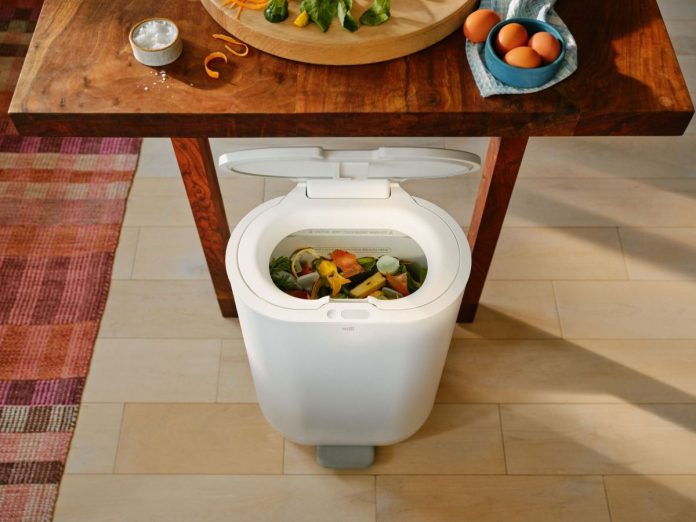Mill, a food waste startup, is releasing an entirely new design of its bin that grinds and dries scraps, turning it into compost-like grounds that can feed plants and chickens alike.
The new bin looks similar to the old one, a sleek take on classic kitchen decor, but the design has been tweaked and the internals have been revamped, Mill co-founder Matt Rogers told TechCrunch.
“The inside is completely redesigned,” he said. “It’s just a lot a lot more energy-efficient, a lot faster.” Where the previous design could take 20 hours to complete a cycle of grinding and drying, Rogers said the new one should be done by breakfast.
“My wife, who’s a tough customer, is kind of surprised how fast it is,” he said. “That’s really good for folks like us at home. But also because it’s faster, there are other applications that this could go into now. Think offices or a little bit more commercial applications.”
The redesigned internals turn the grinding paddles on their sides, adding an additional axle to ensure they sweep the whole bin. The drying function, which used to consist of heating elements below the bin, has been rethought, too. Now, the heating elements surround the entire bin and the fan blows hot air through the food waste as it’s being processed. A charcoal filter remains on the back to absorb any off odors.
Initially, Mill heavily touted its partnership with the U.S. Postal Service, in which mail carriers would pick up the grounds so they could be sent to a processing facility where they would be refined into chicken feed. That program continues nationwide, and a standards body recently certified Mill’s feed product, which should help the startup speed adoption among interested farmers.
But Mill has also been exploring other avenues for getting its grounds back into the food system. In Phoenix, a nearby farm, R.City, will collect grounds from Mill households and use it on their fields. The service includes maintenance, grounds pickup, and four deliveries of compost annually. For a bit extra, customers can get a farm box delivered. Mill has added a few more farms since.
“We’ve actually closed the loop in Phoenix,” Rogers said. “Your food waste is going to a local farm to create more food for the community.”
Mill initially offered its bin only through a subscription, but in recent weeks, it quietly added the option to purchase one outright for $999, pricing which carries over to the new model. The subscription cost has gotten cheaper when billed annually, down $36 to $360, but more expensive when billed month-to-month ($50, up from $45). Anyone can try it for 30 days free.
In Phoenix, the pricing and service differs slightly since the U.S. Postal Service is not involved.
With its focus on hardware and selling to consumers (as opposed to businesses), Mill is a bit of an outlier in climate tech. Consumer hardware is famously challenging, though it helps that Rogers and his co-founder Harry Tannenbaum have been through it before with Nest. Their experience assembling consumer hardware-focused teams might explain how they’ve been able to release a revised version of the bin less than a year after launching the first.
By Rogers’ telling, Mill has been a hit with customers. All 10,000 of the initial batch sold out, and the product’s net promoter score is “north of 70,” he added. “Of all the products I’ve worked on in my career, it might be the best product I’ve ever worked on.”
A good product isn’t a guarantee of long-term success, of course, but Mill’s substantial war chest of more than $232 million, according to PitchBook, should help. The fact that the company is booking revenue should also help it cross the valley of death that often claims early stage startups.
Part of Mill’s speed clearly comes from Rogers, who is a fast-talking, energetic individual. But there’s also a sense that, for Rogers, there’s no time to lose. Mill may have already diverted 1 million pounds of food waste from landfills (and the associated greenhouse gasses), but it’s not enough for him. “The emissions curve is not bending fast enough,” he said.
Source link
Tim De Chant
















